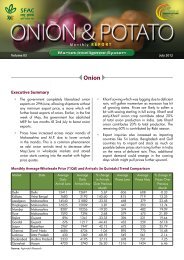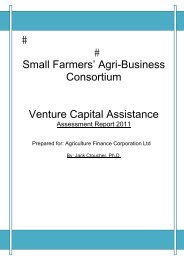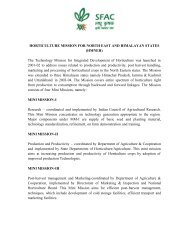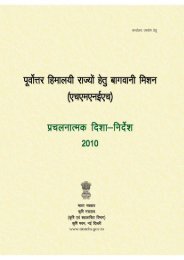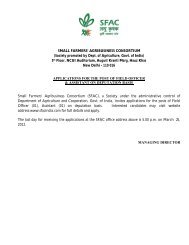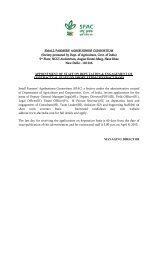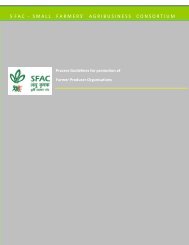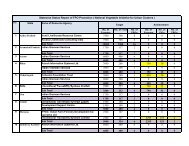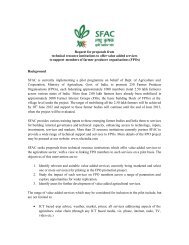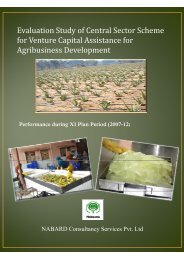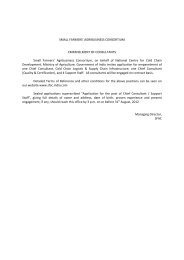ROUND TABLE held at Bihar on 4 July 2012 - SFAC
ROUND TABLE held at Bihar on 4 July 2012 - SFAC
ROUND TABLE held at Bihar on 4 July 2012 - SFAC
Create successful ePaper yourself
Turn your PDF publications into a flip-book with our unique Google optimized e-Paper software.
PROCEEDINGS OF<br />
<str<strong>on</strong>g>ROUND</str<strong>on</strong>g><str<strong>on</strong>g>TABLE</str<strong>on</strong>g> CONFERENCE<br />
ON<br />
ISSUES AND CHALLENGES FACING<br />
FARMER PRODUCER ORGANISATIONS (FPOS)<br />
ORGANISED BY<br />
SMALL FARMERS’ AGRIBUSINESS CONSORTIUM (<strong>SFAC</strong>)<br />
IN COLLABORATION WITH<br />
INDIAN GRAMEEN SERVICES (IGS)<br />
PATNA, BIHAR JULY 4, <strong>2012</strong><br />
Background<br />
Almost every major business house of the country is venturing into the agri-business<br />
sector, especially with regul<str<strong>on</strong>g>at</str<strong>on</strong>g>i<strong>on</strong>s allowing the corpor<str<strong>on</strong>g>at</str<strong>on</strong>g>e sector to enter into direct<br />
c<strong>on</strong>tractual arrangements with farmers. One of the triggers for this newfound interest in<br />
agribusiness by the corpor<str<strong>on</strong>g>at</str<strong>on</strong>g>e sector is the change occurring in the retail markets,<br />
where c<strong>on</strong>sumers are making dram<str<strong>on</strong>g>at</str<strong>on</strong>g>ic shifts from purchasing <str<strong>on</strong>g>at</str<strong>on</strong>g> neighbourhood kirana<br />
stores to shopping <str<strong>on</strong>g>at</str<strong>on</strong>g> supermarkets, malls and food plazas, enabling development of<br />
food supply chains from the farms to c<strong>on</strong>sumers.<br />
With a popul<str<strong>on</strong>g>at</str<strong>on</strong>g>i<strong>on</strong> of over <strong>on</strong>e billi<strong>on</strong> and rising disposable income, the demand for food<br />
is <strong>on</strong>ly growing. Yet the farmers are in distress, as witnessed by the large number of<br />
farmer-suicides. One explan<str<strong>on</strong>g>at</str<strong>on</strong>g>i<strong>on</strong> for this is th<str<strong>on</strong>g>at</str<strong>on</strong>g> the farmer disposes off his produce in<br />
unprocessed form and value additi<strong>on</strong> in agricultural commodities happens <strong>on</strong>ly after<br />
sale by the farmers. The questi<strong>on</strong> is wh<str<strong>on</strong>g>at</str<strong>on</strong>g> can be d<strong>on</strong>e to address this dichotomy of<br />
gre<str<strong>on</strong>g>at</str<strong>on</strong>g>er actual and potential demand for agricultural produce and a st<str<strong>on</strong>g>at</str<strong>on</strong>g>i<strong>on</strong>ary or<br />
worsening situ<str<strong>on</strong>g>at</str<strong>on</strong>g>i<strong>on</strong> of the farmer? One possible soluti<strong>on</strong> may lie in aggreg<str<strong>on</strong>g>at</str<strong>on</strong>g>ed<br />
functi<strong>on</strong>ing through Farmers Producers Organiz<str<strong>on</strong>g>at</str<strong>on</strong>g>i<strong>on</strong> [FPOs].<br />
During the last decade there has been a growing interest from priv<str<strong>on</strong>g>at</str<strong>on</strong>g>e and n<strong>on</strong>governmental<br />
organiz<str<strong>on</strong>g>at</str<strong>on</strong>g>i<strong>on</strong>s in promoting small farmers’ organiz<str<strong>on</strong>g>at</str<strong>on</strong>g>i<strong>on</strong>s. These<br />
organiz<str<strong>on</strong>g>at</str<strong>on</strong>g>i<strong>on</strong>s have since been playing the important role of cre<str<strong>on</strong>g>at</str<strong>on</strong>g>ing str<strong>on</strong>g supply<br />
chains and linking farmers to the market. FPOs have opened new vistas in the<br />
agribusiness sector which explicitly indic<str<strong>on</strong>g>at</str<strong>on</strong>g>es <strong>on</strong> the <strong>on</strong>e hand, requirement of large<br />
scale inputs, and <strong>on</strong> the other, well developed markets for agriculture produce.<br />
FPOs face a number of challenges and hurdles as they grow in number and scale.<br />
There are also opportunities th<str<strong>on</strong>g>at</str<strong>on</strong>g> arise from aggreg<str<strong>on</strong>g>at</str<strong>on</strong>g>ed functi<strong>on</strong>ing. These opportunities<br />
and challenges have to be addressed system<str<strong>on</strong>g>at</str<strong>on</strong>g>ically by bringing together all
stakeholders viz. Government, NGOs, FPOs, priv<str<strong>on</strong>g>at</str<strong>on</strong>g>e sector, aggreg<str<strong>on</strong>g>at</str<strong>on</strong>g>ors and service<br />
providers. Against this backdrop, Small Farmers Agribusiness C<strong>on</strong>sortium (<strong>SFAC</strong>) has<br />
been organizing day-l<strong>on</strong>g Round-Tables in various St<str<strong>on</strong>g>at</str<strong>on</strong>g>es. One such Round-Table was<br />
organized in P<str<strong>on</strong>g>at</str<strong>on</strong>g>na, <str<strong>on</strong>g>Bihar</str<strong>on</strong>g> to understand the issues specific to the St<str<strong>on</strong>g>at</str<strong>on</strong>g>e and to frame the<br />
appropri<str<strong>on</strong>g>at</str<strong>on</strong>g>e policies for the smooth functi<strong>on</strong>ing of FPOs in the St<str<strong>on</strong>g>at</str<strong>on</strong>g>e.<br />
Proceedings<br />
The Round Table workshop commenced with a welcome address by Mr. Mihir Sahana,<br />
Managing Director, Indian Grameen Services (BASIX). This was followed by Mr.<br />
Pravesh Sharma, Managing Director, <strong>SFAC</strong> welcoming the participants and explaining<br />
the mand<str<strong>on</strong>g>at</str<strong>on</strong>g>e of <strong>SFAC</strong>. He explained th<str<strong>on</strong>g>at</str<strong>on</strong>g> the objective of the Round Table was to<br />
discuss the oper<str<strong>on</strong>g>at</str<strong>on</strong>g>i<strong>on</strong>al and policy level issues with respect to FPOs and to bring all<br />
stakeholders together <strong>on</strong> a comm<strong>on</strong> pl<str<strong>on</strong>g>at</str<strong>on</strong>g>form in order to cre<str<strong>on</strong>g>at</str<strong>on</strong>g>e an enabling envir<strong>on</strong>ment<br />
for the organiz<str<strong>on</strong>g>at</str<strong>on</strong>g>i<strong>on</strong>s of small farmers. He expressed the need to discuss the challenges<br />
and opportunities th<str<strong>on</strong>g>at</str<strong>on</strong>g> FPOs encounter or may face in future and the role of the<br />
government sectors, banks, priv<str<strong>on</strong>g>at</str<strong>on</strong>g>e sectors and NGOs.<br />
Objectives and Form<str<strong>on</strong>g>at</str<strong>on</strong>g> of the Roundtable<br />
The objectives of the Roundtable C<strong>on</strong>ference were:<br />
How to integr<str<strong>on</strong>g>at</str<strong>on</strong>g>e the small farmer in the value chain <strong>on</strong> a sustainable and<br />
equitable basis through member driven organis<str<strong>on</strong>g>at</str<strong>on</strong>g>i<strong>on</strong>s<br />
How to sustain an <strong>on</strong>-going dialogue and partnership between FPOs and other<br />
stakeholders <str<strong>on</strong>g>at</str<strong>on</strong>g> the St<str<strong>on</strong>g>at</str<strong>on</strong>g>e level through <strong>SFAC</strong> facilit<str<strong>on</strong>g>at</str<strong>on</strong>g>i<strong>on</strong><br />
The Roundtable discussi<strong>on</strong>s were divided into three sets of issues:<br />
Key challenges in Establishment of FPOs<br />
Finance & Marketing issue in FPOs<br />
Way Forward<br />
A. Key challenges in Establishment of FPOs<br />
Agriculture is the key to the overall development of the St<str<strong>on</strong>g>at</str<strong>on</strong>g>e ec<strong>on</strong>omy. It is the<br />
backb<strong>on</strong>e of <str<strong>on</strong>g>Bihar</str<strong>on</strong>g>'s ec<strong>on</strong>omy, supporting 81% of the workforce and gener<str<strong>on</strong>g>at</str<strong>on</strong>g>ing<br />
nearly 42% of the St<str<strong>on</strong>g>at</str<strong>on</strong>g>e Domestic Product. According to 2004-05 d<str<strong>on</strong>g>at</str<strong>on</strong>g>a, nearly<br />
42% of the GDP of the st<str<strong>on</strong>g>at</str<strong>on</strong>g>e was c<strong>on</strong>tributed by agriculture sector (including<br />
forestry and fishing). The st<str<strong>on</strong>g>at</str<strong>on</strong>g>e has <str<strong>on</strong>g>at</str<strong>on</strong>g>tained self sufficiency in food grains<br />
producti<strong>on</strong>. However, barring maize and pulses, productivity of various farm<br />
produce in <str<strong>on</strong>g>Bihar</str<strong>on</strong>g> is far below the n<str<strong>on</strong>g>at</str<strong>on</strong>g>i<strong>on</strong>al average. Though the area under<br />
cultiv<str<strong>on</strong>g>at</str<strong>on</strong>g>i<strong>on</strong> is shrinking, there is tremendous scope for income gener<str<strong>on</strong>g>at</str<strong>on</strong>g>i<strong>on</strong>, by<br />
improving productivity. Adverse clim<str<strong>on</strong>g>at</str<strong>on</strong>g>ic c<strong>on</strong>diti<strong>on</strong>, like draught and floods, also<br />
play a role in low producti<strong>on</strong> levels.
Many SHGs feder<str<strong>on</strong>g>at</str<strong>on</strong>g>i<strong>on</strong>s are registered as self-reliant cooper<str<strong>on</strong>g>at</str<strong>on</strong>g>ives and are<br />
functi<strong>on</strong>al in the st<str<strong>on</strong>g>at</str<strong>on</strong>g>e. There is very little awareness about Farmers Producer<br />
Organiz<str<strong>on</strong>g>at</str<strong>on</strong>g>i<strong>on</strong>s [FPOs] in the st<str<strong>on</strong>g>at</str<strong>on</strong>g>e. In fact, officials of commercial banks,<br />
government departments and even Chartered Accountants have little inform<str<strong>on</strong>g>at</str<strong>on</strong>g>i<strong>on</strong><br />
about FPCs.<br />
Social and political issues significantly affect the form<str<strong>on</strong>g>at</str<strong>on</strong>g>i<strong>on</strong> and functi<strong>on</strong>ing of<br />
FPOs. For example, different Collecti<strong>on</strong> Centers had to be established <strong>on</strong> the<br />
basis of caste and community. This was to enable direct procurement of<br />
vegetables by the retailer which would benefit the farmer by giving her/him<br />
P<str<strong>on</strong>g>at</str<strong>on</strong>g>na market prices <str<strong>on</strong>g>at</str<strong>on</strong>g> the farm-g<str<strong>on</strong>g>at</str<strong>on</strong>g>e.<br />
Comm<strong>on</strong> benefit groups with comm<strong>on</strong> activities remain str<strong>on</strong>g even if some<br />
political forces try to disband them. They will stay together as l<strong>on</strong>g as there is<br />
profit in doing so. Hence it is important to give them short term gains to keep<br />
their interest up.<br />
FPO form<str<strong>on</strong>g>at</str<strong>on</strong>g>i<strong>on</strong> requires an external agent to mobilize the farmers first in a<br />
comm<strong>on</strong> interest group and then feder<str<strong>on</strong>g>at</str<strong>on</strong>g>e a number of such groups <strong>on</strong> to a<br />
feder<str<strong>on</strong>g>at</str<strong>on</strong>g>i<strong>on</strong>. C<strong>on</strong>tinuous hand-holding is required to build capacities. The<br />
sustainability of the organiz<str<strong>on</strong>g>at</str<strong>on</strong>g>i<strong>on</strong> will be <str<strong>on</strong>g>at</str<strong>on</strong>g> stake without this investment of time<br />
and resource. The process of form<str<strong>on</strong>g>at</str<strong>on</strong>g>i<strong>on</strong> and registr<str<strong>on</strong>g>at</str<strong>on</strong>g>i<strong>on</strong> is too complex for<br />
farmers to handle by themselves. The Promoters, however, will have to be<br />
vigilant about providing support and guarding against taking over the decisi<strong>on</strong>–<br />
making role. In <strong>on</strong>e case, women who were 7 th and 8 th class pass could take up<br />
leadership role and marketing resp<strong>on</strong>sibilities when trained to stand <strong>on</strong> their own<br />
feet. The Promoting Organiz<str<strong>on</strong>g>at</str<strong>on</strong>g>i<strong>on</strong> has to assist the FPO to organize access to<br />
input suppliers and facilit<str<strong>on</strong>g>at</str<strong>on</strong>g>e aggreg<str<strong>on</strong>g>at</str<strong>on</strong>g>ed marketing.<br />
So far NGOs in <str<strong>on</strong>g>Bihar</str<strong>on</strong>g> have not taken up the work of FPO form<str<strong>on</strong>g>at</str<strong>on</strong>g>i<strong>on</strong> in a<br />
significant way. The reas<strong>on</strong> for this has to be analyzed. There is a cost to the<br />
salaried staff brought in by external facilit<str<strong>on</strong>g>at</str<strong>on</strong>g>ors; other schemes may be more<br />
<str<strong>on</strong>g>at</str<strong>on</strong>g>tractive because more funds are available through them to pay for staff and for<br />
other expenses. As an exit str<str<strong>on</strong>g>at</str<strong>on</strong>g>egy of the Promoting Agencies, farmers and<br />
local youth should be trained to take <strong>on</strong> the role played by the Promoting Agency<br />
- it is likely th<str<strong>on</strong>g>at</str<strong>on</strong>g> he/she would be more willing to take risks and try harder than a<br />
paid employee. It has been observed th<str<strong>on</strong>g>at</str<strong>on</strong>g> there is a high level of dependence of<br />
the NGO staff for <str<strong>on</strong>g>at</str<strong>on</strong>g> least three years.<br />
NABARD provides capacity building assistance to build the organiz<str<strong>on</strong>g>at</str<strong>on</strong>g>i<strong>on</strong>, <str<strong>on</strong>g>at</str<strong>on</strong>g> the<br />
r<str<strong>on</strong>g>at</str<strong>on</strong>g>e of Rs 10,000 per year for three years. Often this inform<str<strong>on</strong>g>at</str<strong>on</strong>g>i<strong>on</strong> is not available<br />
with the qualifying organiz<str<strong>on</strong>g>at</str<strong>on</strong>g>i<strong>on</strong>s.<br />
Currently farmers have no access to the extensi<strong>on</strong> services. KVKs, cre<str<strong>on</strong>g>at</str<strong>on</strong>g>ed to<br />
provide farmers access to appropri<str<strong>on</strong>g>at</str<strong>on</strong>g>e technology, is usually too far for the small
and marginal farmer to c<strong>on</strong>tact. There is need to raise productivities and<br />
gener<str<strong>on</strong>g>at</str<strong>on</strong>g>e marketable surplus. The facilit<str<strong>on</strong>g>at</str<strong>on</strong>g>ing NGO has to fill this gap.<br />
Lack of basic infrastructure is another bottleneck in form<str<strong>on</strong>g>at</str<strong>on</strong>g>i<strong>on</strong> of FPOs. Roads,<br />
access to power, storage, market yards are required for marketing.<br />
One of the bottlenecks in form<str<strong>on</strong>g>at</str<strong>on</strong>g>i<strong>on</strong> of FPOs is the large amount of complic<str<strong>on</strong>g>at</str<strong>on</strong>g>ed<br />
document<str<strong>on</strong>g>at</str<strong>on</strong>g>i<strong>on</strong> th<str<strong>on</strong>g>at</str<strong>on</strong>g> is required. The farmers can neither understand them nor<br />
manage to deal with them.<br />
B. Finance & Marketing issue in FPOs<br />
Small farmers’ membership in cooper<str<strong>on</strong>g>at</str<strong>on</strong>g>ives is 3% in <str<strong>on</strong>g>Bihar</str<strong>on</strong>g> against 30% <str<strong>on</strong>g>at</str<strong>on</strong>g> the<br />
n<str<strong>on</strong>g>at</str<strong>on</strong>g>i<strong>on</strong>al level; membership of this group in Self Help Groups [SHG] is 0.8% in<br />
<str<strong>on</strong>g>Bihar</str<strong>on</strong>g> against 4.8 % <str<strong>on</strong>g>at</str<strong>on</strong>g> the n<str<strong>on</strong>g>at</str<strong>on</strong>g>i<strong>on</strong>al level; membership in registered organiz<str<strong>on</strong>g>at</str<strong>on</strong>g>i<strong>on</strong><br />
is 0.3% in <str<strong>on</strong>g>Bihar</str<strong>on</strong>g> and 2.2 % across the n<str<strong>on</strong>g>at</str<strong>on</strong>g>i<strong>on</strong>. These st<str<strong>on</strong>g>at</str<strong>on</strong>g>istics are indic<str<strong>on</strong>g>at</str<strong>on</strong>g>ive of<br />
the positi<strong>on</strong> of small and marginal farmers in <str<strong>on</strong>g>Bihar</str<strong>on</strong>g>. There should be three or<br />
four schemes exclusively for small and marginal farmers because the issues and<br />
c<strong>on</strong>cerns of this group are different from th<str<strong>on</strong>g>at</str<strong>on</strong>g> of other farmers.<br />
The St<str<strong>on</strong>g>at</str<strong>on</strong>g>e Level Bankers’ Committees should track the flow of credit to this<br />
group. Commercial banks are not keen to finance small and marginal farmers.<br />
Requirements of a professi<strong>on</strong>ally produced Business Plan tend to discourage the<br />
small farmers who have no access to the resources required to produce such a<br />
Plan. Currently <strong>on</strong>ly selected groups with the appropri<str<strong>on</strong>g>at</str<strong>on</strong>g>e political c<strong>on</strong>necti<strong>on</strong>s<br />
have access to credit. The government should provide some guarantee to cover<br />
this risk.<br />
Small farmers require immedi<str<strong>on</strong>g>at</str<strong>on</strong>g>e m<strong>on</strong>ey - their livelihood depends <strong>on</strong> the sale of<br />
the harvest. They tie up with local traders who lend working capital funds to them<br />
and provide inputs, <str<strong>on</strong>g>at</str<strong>on</strong>g> a premium and purchase the produce <str<strong>on</strong>g>at</str<strong>on</strong>g> a discount. On the<br />
other hand it is difficult for the small famers to compete with traders who c<strong>on</strong>trol a<br />
large part of the value chain with their network of retail shops, access to funds<br />
and infrastructure. Governmental mandis are captured by local traders and small<br />
farmers are unable to penetr<str<strong>on</strong>g>at</str<strong>on</strong>g>e them to sell their output.<br />
There are 20,000 NABARD farmer Clubs in <str<strong>on</strong>g>Bihar</str<strong>on</strong>g>. There is hardly any financial<br />
instituti<strong>on</strong> in the St<str<strong>on</strong>g>at</str<strong>on</strong>g>e, besides NABARD, th<str<strong>on</strong>g>at</str<strong>on</strong>g> are sensitive to the needs of the<br />
farming community with its requirement of working capital and the need to market<br />
perishable produce. The few th<str<strong>on</strong>g>at</str<strong>on</strong>g> functi<strong>on</strong> in the st<str<strong>on</strong>g>at</str<strong>on</strong>g>e are not interested to taking<br />
any proactive steps to reach out to the farmers. On the other hand default r<str<strong>on</strong>g>at</str<strong>on</strong>g>es<br />
are very high; farmers remain indebted in the hope of a future waiver.<br />
There is a wide price vari<str<strong>on</strong>g>at</str<strong>on</strong>g>i<strong>on</strong> between the rural areas and the town/city.<br />
However many small and marginal farmers find it easier to sell in the village ha<str<strong>on</strong>g>at</str<strong>on</strong>g>.
There are 1500 ha<str<strong>on</strong>g>at</str<strong>on</strong>g>s in <str<strong>on</strong>g>Bihar</str<strong>on</strong>g>. These should be developed and <str<strong>on</strong>g>at</str<strong>on</strong>g> least basic<br />
facilities made available.<br />
Kisan Credit Cards [KCC] allows farmers to have cash credit facilities, such as<br />
credit for working capital, without going through time-c<strong>on</strong>suming bank credit<br />
screening processes repe<str<strong>on</strong>g>at</str<strong>on</strong>g>edly. Repayment can be rescheduled if there is a bad<br />
crop seas<strong>on</strong>, and extensi<strong>on</strong>s are offered for up to 4 years. Although the scheme<br />
was formed to assist small farmers, the procedure to acquire these KCC is very<br />
complic<str<strong>on</strong>g>at</str<strong>on</strong>g>ed and hence difficult to obtain.<br />
Should the Promoting NGO get into business itself? The perspective in<br />
enterprise development ranges from 3-5 years to life-l<strong>on</strong>g. Established <strong>on</strong>es<br />
enjoy enormous power from the linkages and rel<str<strong>on</strong>g>at</str<strong>on</strong>g>i<strong>on</strong>ships built up over several<br />
years and sometimes several gener<str<strong>on</strong>g>at</str<strong>on</strong>g>i<strong>on</strong>s. A Promoting NGO may expend its<br />
energies better in providing back-stopping support and in facilit<str<strong>on</strong>g>at</str<strong>on</strong>g>ing forging<br />
linkages for the FPO.<br />
The significant potential of undertaking web-based marketing has to be explored.<br />
The participants from the input supplier companies showed c<strong>on</strong>siderable interest<br />
in tying-up with FPOs.<br />
C. Policy challenges and Way Forward<br />
In the last sessi<strong>on</strong> it was proposed th<str<strong>on</strong>g>at</str<strong>on</strong>g> <strong>on</strong>e p<str<strong>on</strong>g>at</str<strong>on</strong>g>hway which could help to meet many of<br />
the challenges highlighted in the RTD is the setting up a permanent mechanism to<br />
network FPOs <str<strong>on</strong>g>at</str<strong>on</strong>g> the st<str<strong>on</strong>g>at</str<strong>on</strong>g>e level. The proposal is to set up a st<str<strong>on</strong>g>at</str<strong>on</strong>g>e level FPO Committee<br />
under the banner of <strong>SFAC</strong> to support the various needs of FPOs. The membership will<br />
be open to all registered FPOs within the st<str<strong>on</strong>g>at</str<strong>on</strong>g>e. The forum will first prepare a d<str<strong>on</strong>g>at</str<strong>on</strong>g>abase<br />
of FPOs in <str<strong>on</strong>g>Bihar</str<strong>on</strong>g>. It will then prepare an acti<strong>on</strong> plan <strong>on</strong> the basis of priorities expressed<br />
by members units. The Samiti will provide a pl<str<strong>on</strong>g>at</str<strong>on</strong>g>form for the needs and views of FPOs<br />
to be articul<str<strong>on</strong>g>at</str<strong>on</strong>g>ed. Soluti<strong>on</strong>s to address these will be explored in a collective manner; the<br />
Samiti will try for c<strong>on</strong>vergence with the <strong>on</strong>going schemes of different departments,<br />
financial instituti<strong>on</strong>s and banks and will also try to build access of the farmers to input<br />
suppliers, to technical service providers, to legal, finance, audit and to insurance<br />
experts. In additi<strong>on</strong>, the Samiti will advise FPOs <strong>on</strong> various registr<str<strong>on</strong>g>at</str<strong>on</strong>g>i<strong>on</strong> m<str<strong>on</strong>g>at</str<strong>on</strong>g>ters and will<br />
lobby with the policy makers to promote, propag<str<strong>on</strong>g>at</str<strong>on</strong>g>e pro-producers’ organiz<str<strong>on</strong>g>at</str<strong>on</strong>g>i<strong>on</strong> policies<br />
in the st<str<strong>on</strong>g>at</str<strong>on</strong>g>e. The detailed modalities, frequency of meetings, the agenda of the Samiti<br />
may be worked out in a particip<str<strong>on</strong>g>at</str<strong>on</strong>g>ory manner. A local instituti<strong>on</strong> will be identified by<br />
<strong>SFAC</strong> to launch this forum as so<strong>on</strong> as possible.<br />
The idea of cre<str<strong>on</strong>g>at</str<strong>on</strong>g>ing such a network was unanimously endorsed by the participants. It<br />
was felt th<str<strong>on</strong>g>at</str<strong>on</strong>g> leveraging the collective bargaining power of FPO members is <strong>on</strong>ly<br />
possible with a str<strong>on</strong>g pl<str<strong>on</strong>g>at</str<strong>on</strong>g>form th<str<strong>on</strong>g>at</str<strong>on</strong>g> represents their interests. The meeting ended with a<br />
resoluti<strong>on</strong> th<str<strong>on</strong>g>at</str<strong>on</strong>g> all stakeholders will work towards making the FPO Committee<br />
oper<str<strong>on</strong>g>at</str<strong>on</strong>g>i<strong>on</strong>al within the next three m<strong>on</strong>ths.
List of Participants<br />
S.No. Name Design<str<strong>on</strong>g>at</str<strong>on</strong>g>i<strong>on</strong> Organiz<str<strong>on</strong>g>at</str<strong>on</strong>g>i<strong>on</strong> Email C<strong>on</strong>tact<br />
Number<br />
1. Mr. Pravesh Managing <strong>SFAC</strong>, New Delhi pravesh.sharma@ni 011‐<br />
Sharma<br />
Director<br />
c.in<br />
23019899<br />
2. Dr. Vijaya Lakshmi Secretary Dept. of agridep‐bih@nic.in 0612‐<br />
Nadendla<br />
Agriculture<br />
2215373<br />
3. Dr. Jaya Ch<str<strong>on</strong>g>at</str<strong>on</strong>g>terji Sr. Advisor <strong>SFAC</strong>, New Delhi jaya.ch<str<strong>on</strong>g>at</str<strong>on</strong>g>terji@gmail 011‐<br />
.com<br />
23019899<br />
4. Mr. Sanjeev Sr. C<strong>on</strong>sultant <strong>SFAC</strong>, New Delhi 011‐<br />
23019899<br />
5. Dr. Ravi MD BDT ravi.chandra@bihar<br />
dev.org<br />
9771438191<br />
6. Mr. Mithilesh AGM NABARD mithilesh.kumar@n 9862886747<br />
Kumar<br />
abardmail.com<br />
7. Mr. Ramadhar IAS (retd.) mr.ramadhar@gmai<br />
l.com<br />
9631624730<br />
8. Mr. Mihir Sahana MD Indian Grameen mihir@basixindia.co 9771493321<br />
Services (BASIX) m<br />
9. Dr. S.S.Singh Head Scientist ICAR 9473400125<br />
10. Abhay Kumar Head NSEL, P<str<strong>on</strong>g>at</str<strong>on</strong>g>na abhay.kumar@n<str<strong>on</strong>g>at</str<strong>on</strong>g>io<br />
nalspotexchange.co<br />
m<br />
9955991601<br />
11. C.P. Sinha Chairman Rajya Kisan<br />
Aayog<br />
9931026315<br />
12. Dr. R K Singh Scientist CPRS, P<str<strong>on</strong>g>at</str<strong>on</strong>g>na rksingh.cprs@gmail. 9199423505
13. R.K.Sinha Chief Manager SBI<br />
com<br />
rajesh.sinha@sbi.co.<br />
in<br />
9430920539<br />
14. Nayan Ranjan C<strong>on</strong>sultant Indian Grameen nayanrana.iifm@gm 8541887584<br />
Services (BASIX) ail.com<br />
15. Dharmendra St<str<strong>on</strong>g>at</str<strong>on</strong>g>e Head Indian Grameen dharmendra.s@basi 9835325211<br />
Shriwastva<br />
Services (BASIX) xindia.com<br />
16. M.D. Idrish General<br />
Secretory<br />
TASFARCA 9931678838<br />
17. Suman Tiwari General<br />
Secretory<br />
TASFARCA 9931254065<br />
18. Shahnawaz Ahmad DPM WDC 9955998060<br />
19. Vikas Kumar DPM WDC 9955998045<br />
20. Yogendra Kumar FDE Jagriti<br />
Feder<str<strong>on</strong>g>at</str<strong>on</strong>g>i<strong>on</strong>,<br />
Maner<br />
9708108580<br />
21. Ranjit Dhar CEO SSSPCL(Producer<br />
Company)<br />
8083117625<br />
22. Avinash Bisen P.O. ITC avinash.bisen@itc.in 9955994826<br />
23. Pranjal Tem Leader PRADAN 9431548082<br />
24. Bambam Kumar Sr. Sales Maple Orgtech bambamkumar07@ 9709579481<br />
Executive Ltd.<br />
yahoo.com<br />
25. R.R.Kalyan ED CDOT kalian.kr@gmail.co<br />
m<br />
9431004334<br />
26. Manilekha Dayal Law<br />
Document<str<strong>on</strong>g>at</str<strong>on</strong>g>i<strong>on</strong> lekha‐<br />
9835286592<br />
Professi<strong>on</strong>al Centre<br />
mani@yahoo.co.in<br />
27. Neeraj Verma St<str<strong>on</strong>g>at</str<strong>on</strong>g>e Head Access neeraj@accessdev.o<br />
rg<br />
9771493884<br />
28. Shailesh SPM AKF 9471000212<br />
29. Rajib Kumar Raul Manager (Agri AKRSP agribihar@akrspi.or 9771476624<br />
&Livelihood)<br />
g<br />
30. Debasish GM AKRSP gm.bihar@akrspi.or<br />
g<br />
9771476637<br />
31. Vijay Kumar Supervisior 8409231303<br />
32. Durgeshwar Farmer 8804011025<br />
33. Manoj Kumar Farmer 9631530441<br />
34. Ritesh kumar Sakhi sakhibihar@gmail.c<br />
om<br />
9955998036<br />
35. Ajit Kumar Roy N<str<strong>on</strong>g>at</str<strong>on</strong>g>i<strong>on</strong>al Geolite akroy@geoliteorgan 8986192352<br />
Manager<br />
ics.com<br />
36. Kaushlendra MT Kausalya<br />
Found<str<strong>on</strong>g>at</str<strong>on</strong>g>i<strong>on</strong><br />
9304446443
37. Ajay Kumar Director Kausalya<br />
Found<str<strong>on</strong>g>at</str<strong>on</strong>g>i<strong>on</strong><br />
9386494453<br />
38. Rekha Kumari Kausalya rekha.kumari@kaus 9334407981<br />
Found<str<strong>on</strong>g>at</str<strong>on</strong>g>i<strong>on</strong> halyafound<str<strong>on</strong>g>at</str<strong>on</strong>g>i<strong>on</strong>.org<br />
39. Jitendra Kumar PA, chairman Rajya Kisan<br />
Aayog<br />
9386335593<br />
40. Shishir Ranjan Head Green B‐ABLE shishir.ranjan@b‐ 9650500990<br />
Skill<br />
able.in<br />
41. Alok Ranjan Godrej, P<str<strong>on</strong>g>at</str<strong>on</strong>g>na alokranjan.pt@gmai<br />
l.com<br />
9470405596<br />
42. N.K. Roy DHO, P<str<strong>on</strong>g>at</str<strong>on</strong>g>na Agriculture Dept. nkroydho@gmail.co<br />
m<br />
9431818936<br />
43. Sarasw<str<strong>on</strong>g>at</str<strong>on</strong>g>i Devi Chairman Farmers<br />
cooper<str<strong>on</strong>g>at</str<strong>on</strong>g>ive<br />
8409805372<br />
44. Brajesh Das DGM KGVK bragjesh.d@kgvk.or 9308966788<br />
45. Sanjeev Kr Singh PM Nidan sanjeev@nidan.in 9572914997<br />
46. Hare Ram Roy St<str<strong>on</strong>g>at</str<strong>on</strong>g>e<br />
Manager(Agri)<br />
IIFCO hareram@iifco.com 9771473405<br />
47. Mohit Kumar Director KGVK mohit.k@kgvkagro.c<br />
om<br />
9334726481<br />
48. Ranjeet Head – KGVK ranjeet.g@kgvkagro. 9308966794<br />
Marketing<br />
com<br />
49. Pawan Ojha<br />
50.<br />
St<str<strong>on</strong>g>at</str<strong>on</strong>g>e Manager Digital green pawan@digitalgree<br />
n.org<br />
9431161172<br />
51. P.P.Ghosh Director ADRI ppghoshadri@yaho<br />
o.co.in<br />
9431024906<br />
52. B.Dayal CBO Cooper<str<strong>on</strong>g>at</str<strong>on</strong>g>ive document<str<strong>on</strong>g>at</str<strong>on</strong>g>i<strong>on</strong>.cent<br />
re.10@gmail.com<br />
9835286592<br />
53. A.Saxena Senior sales Godrej Agrovet ajitabh.saxena@god 7631999673<br />
executive<br />
rejagrovet.com<br />
54. U.K. Sharma VASFA 9430864346<br />
55. Rajdeo Roy Secretary 8877508513<br />
56. Shashank Kumar Co‐founder Farms & Farmers shashank.verma@g<br />
mail.com<br />
8757912744<br />
57. Rajeev Ranjan Samriddi benipuri2001@yaho<br />
o.co.in<br />
7870659397<br />
58. Anil Verma TL PRADAN anilverma@pradan.<br />
net<br />
9934259579<br />
59. Kunal Ranjan MIS coordin<str<strong>on</strong>g>at</str<strong>on</strong>g>or Indian Grameen kunal.ranjan@basixi 9507949346<br />
Services (BASIX) ndia.com



